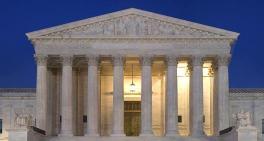Wisconsin’s pandemic election puts focus on state’s court
Bar Associations
Anyone needing proof of the power and significance of the Wisconsin Supreme Court can look no further than the lines of mask-wearing voters that stretched for hours in Milwaukee during an election held despite a stay-at-home order because of the coronavirus pandemic.
An election-eve decision by the court overturning the governor’s order to postpone the vote made the state an outlier in pushing ahead with voting, ignoring pleadings from health experts and local officials about the danger of spreading the virus.
The fact that Wisconsin went forward when other states delayed their elections, and that many voters were willing to endure long waits to cast ballots, reflects the hotly disputed role the court has taken in a state with outsize importance in national politics.
Republicans and Democrats both see Wisconsin as crucial to winning national elections and gaining control of Congress. Historically, elections in the state are decided by close margins and power has flipped between the parties.
Since conservatives have held a majority on the state Supreme Court, the Republican-dominated Legislature has been able to enact laws that enhanced the GOP’s position, including voter ID laws and limits on labor unions, despite legal challenges from Democrats. The court would play a pivotal role in reviewing the drawing of new district lines for legislative and congressional offices following the 2020 census, which has a major impact on the balance of political power.
On the ballot Tuesday for a 10-year term was one of the justices in the court’s 5-2 conservative majority, Dan Kelly.
Democrats charged that holding the election when many voters might stay home would unduly benefit Republicans, who generally fare better in low-turnout ballots. Wisconsin’s Supreme Court elections are nonpartisan in name only.
No turnout information was available from Tuesday’s vote. The results can’t be posted until April 13, allowing time for counting absentee ballots.
Related listings
-
NC court: Counties not responsible for school underfunding
Bar Associations 12/26/2018North Carolina's top court says the state is responsible, not the counties, when schools are so underfunded that some children don't get the constitutionally required sound basic education.In a decision issued Friday, the state Supreme Court ruled ag...
-
Bahrain opposition leader sentenced to life by high court
Bar Associations 11/03/2018A Shiite cleric who was a central figure in Bahrain's 2011 Arab Spring protests was sentenced to life in prison Sunday on spying charges.The ruling by the Supreme Court of Appeals came after Sheikh Ali Salman was acquitted of the charges by a lower c...
-
Court rules that Kushner firm must disclose partners' names
Bar Associations 01/31/2018A federal judge ruled Friday that the family company once run by Jared Kushner isn't allowed to keep secret the identity of its business partners in several Maryland properties.A U.S. district judge in the state rejected the argument that the privacy...

Chicago Business Fraud Attorney
Business Fraud can take many forms. In the broadest terms, a fraud occurs when someone intentionally deceives others for personal gain. Many times business fraud is harmful and recovery is necessary. Losing your personal or business’s assets can devastate your entire life. Contact Roth Law Groupto receive help on restoring your business to normalcy before you were victimized with fraud. Business fraud cases can involve multiple people and complicated schemes aimed at deceiving the public, auditors, investigators, or others. Whether you are dealing with corporate fraud or commercial fraud, we can step in and fight back to receive compensation that you deserve.
At Roth Law Group we are devoted to prosecuting and defending the legal rights of individuals and small businesses, as either plaintiff or defendant. Proving fraud can be extremely difficult. To have a successful business fraud case, one must prove that the defendant purposefully set out to defraud the victim. Fraud cases are being investigated more aggressively than ever. With increasing federal regulation and scrutiny of corporate practises, many individuals and businesses find themselves the subject of business fraud investigations.



